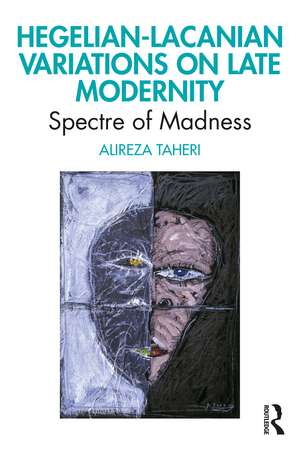Hegelian-Lacanian Variations on Late Modernity: Spectre of Madness
Autor Alireza Taherien Limba Engleză Paperback – 30 dec 2020
With the aid of this theoretical apparatus, the book argues how certain conceptual pairs appear opposed through an operation of misrecognition christened, following Hegel, as "diremption". The failure to reckon with identities-in-difference relegates the subject to more vicious contradictions that define central aspects of our contemporary predicament. The repeated thesis of the treatise is that the deadlocks marking our contemporary situation require renewed engagement with dialectical thinking beyond the impasses of common understanding. Only by embarking on this philosophical-psychoanalytic "path of despair" (Hegel) will we stand a chance of achieving "joyful wisdom" (Nietzsche).
Developing a unique dialectical theory based on readings of Hegel, Lacan and Žižek, in order to address various philosophical and psychoanalytic questions, this book will be of great interest to anyone interested in German idealism and/or psychoanalytic theory.
| Toate formatele și edițiile | Preț | Express |
|---|---|---|
| Paperback (1) | 299.53 lei 6-8 săpt. | |
| Taylor & Francis – 30 dec 2020 | 299.53 lei 6-8 săpt. | |
| Hardback (1) | 1093.58 lei 6-8 săpt. | |
| Taylor & Francis – 30 dec 2020 | 1093.58 lei 6-8 săpt. |
Preț: 299.53 lei
Preț vechi: 315.29 lei
-5% Nou
Puncte Express: 449
Preț estimativ în valută:
57.32€ • 59.39$ • 47.84£
57.32€ • 59.39$ • 47.84£
Carte tipărită la comandă
Livrare economică 22 martie-05 aprilie
Preluare comenzi: 021 569.72.76
Specificații
ISBN-13: 9780367523077
ISBN-10: 0367523078
Pagini: 192
Dimensiuni: 156 x 234 x 12 mm
Greutate: 0.27 kg
Ediția:1
Editura: Taylor & Francis
Colecția Routledge
Locul publicării:Oxford, United Kingdom
ISBN-10: 0367523078
Pagini: 192
Dimensiuni: 156 x 234 x 12 mm
Greutate: 0.27 kg
Ediția:1
Editura: Taylor & Francis
Colecția Routledge
Locul publicării:Oxford, United Kingdom
Public țintă
Postgraduate, Professional, and Professional Practice & DevelopmentCuprins
Introduction: The Paradox of Self-Reflection Variation 1: The Diremptive Remains Variation 2: The Triumph of Dialectical "Lower" Terms Variation 3: Speculative Topology Variation 4: Vicious Dialectical Reversals Variation 5: Faith and Reason Variation 6: The Paradoxes of Love Variation 7: The Paradox of Identity Variation 8: Subject and Collective Variation 9: Ausstossung and Verwerfung Variation 10: Symbolic Murder and Suicide Variation11: Generational Difference: Parent and Child Variation 12: Power Difference: Analysand and Analyst Variation 13: Sexual Difference: Man and Woman Variation 14: The Paradox of a Boundary Without a Limit Variation 15: Good and Evil Variation 16: Truth and Lies Variation 17: Thrownness and Autonomy Variation 18: Life and Death Variation 19: The Force and Frailty of the Law Variation 20: Madness and Sanity Variation 21: The Diremptions of Fantasy Variation 22: The Untimely-Contemporary Variation 23: Religion and Atheism Variation 24: The Death of God Variation 25: The Symptom as Human Notion Conclusion: From Via Dolorosa to Gaya Scienza
Notă biografică
Alireza Taheri provides psychoanalytic psychotherapy in private practice in Toronto where he is also actively involved in teaching Lacanian theory at the Toronto Psychoanalytic Institute and Society. Alireza is a permanent faculty member of HamAva Psychoanalytic Institute in Tehran (Iran) where he teaches psychoanalytic theory and practice. He is also engaged in writing articles on philosophy and psychoanalysis and is presently the editor-in-chief and book review editor of Psychoanalytic Discourse (an independent international journal for the clinical, theoretical and cultural discussion of psychoanalysis).
Recenzii
"Alireza Taheri's bookprovides the ultimate proof that a combination of Hegel's dialectics and Lacan's psychoanalytic theory is the best instrument to analyse the madness of our late capitalist modernity. Spectre of Madness is not yet another book on Hegel and Lacan - it is simply a book for everyone who wants to understand how things could have gone so wrong after Fukuyama proclaimed the end of history." - Slavoj Žižek, Birkbeck Institute for the Humanities of the University of London
"Taheri clearly and perceptively retraces the complexity of modern Western philosophy from Kant onward, using the key concept of Diremption. This book is a precious tool for anyone looking for an up-to-date examination of psychoanalysis through philosophical reflection." - Sergio Benvenuto, Institute of Cognitive Sciences and Technologies of the Italian National Research Council in Rome
"InHegelian-Lacanian Variations on Late Modernity: Spectre of Madness, Alireza Taheri creatively recasts the notion of negativity at the intersection of German idealism and psychoanalysis. On the basis of a Lacanian rendition of Hegelian contradiction, Taheri’s book meticulously and insightfully explores a series of irresolvable antinomies both organizing and unsettling human subjects. Kant famously asked ‘What may I hope?’ Taheri, on the basis of his wide-ranging assessment of the contradictions that make (and unmake) who we are, could be said to confront us with the equally important sobering question: ‘For what may I not hope?’" - Adrian Johnston, Department of Philosophy University of New Mexico
"Taheri clearly and perceptively retraces the complexity of modern Western philosophy from Kant onward, using the key concept of Diremption. This book is a precious tool for anyone looking for an up-to-date examination of psychoanalysis through philosophical reflection." - Sergio Benvenuto, Institute of Cognitive Sciences and Technologies of the Italian National Research Council in Rome
"InHegelian-Lacanian Variations on Late Modernity: Spectre of Madness, Alireza Taheri creatively recasts the notion of negativity at the intersection of German idealism and psychoanalysis. On the basis of a Lacanian rendition of Hegelian contradiction, Taheri’s book meticulously and insightfully explores a series of irresolvable antinomies both organizing and unsettling human subjects. Kant famously asked ‘What may I hope?’ Taheri, on the basis of his wide-ranging assessment of the contradictions that make (and unmake) who we are, could be said to confront us with the equally important sobering question: ‘For what may I not hope?’" - Adrian Johnston, Department of Philosophy University of New Mexico
Descriere
The current rise in new religions and the growing popularity of New Ageism is concomitant with an increasingly anti-philosophical sentiment marking our contemporary situation. Combatting this trend, this treatise develops a theoretical apparatus based on Hegelian speculative reason and Lacanian psychoanalysis.
